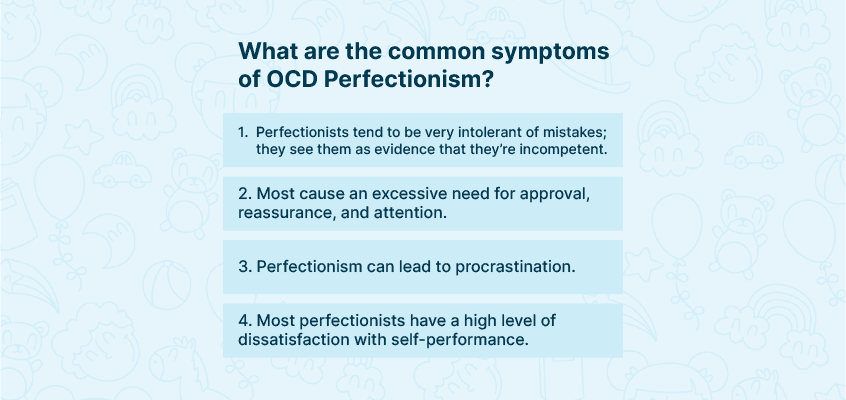What differentiates OCD Perfectionism from just Perfectionism?
For many people, the terms OCD and perfectionism are synonymous. But, in reality, these two mental illnesses represent different aspects of a person’s life and get projected in different ways. It is common for someone to suffer from both disorders, but it is rare to find someone who suffers from just one of them.
What is Perfectionism?
Perfectionism is the sense that one’s self-worth is dependent on one’s success in meeting high expectations. It can be a healthy trait when it spurs people to persist in the face of difficulties and obstacles. However, it can also be destructive when it leads people to become paralysed by unrealistic expectations. The idea of perfection can apply to specific circumstances such as work or appearance or can involve an all-encompassing need for things to be perfect.
The sense of perfectionism affects different people in different ways. Those with social perfectionism may feel internal pressure not to embarrass themselves in front of others and experience distress when they fail to meet these standards. In contrast, those with self-oriented perfectionism may emphasise not disappointing their ideals and values and become distressed when they do not live up to their expectations.
In some cases, excessive self-criticism or high levels of anxiety about making mistakes can significantly impact life.
Our Wellness Programs
Looking for services related to this subject? Get in touch with these experts today!!
Experts

Neelam Parwani

India
Life Coach
Experience: 5 years

Mansi Chawla

India
Psychologist
Experience: 12 years

Sapna Zarwal

India
Psychologist
Experience: 19 years

Deepti Gandhi

India
Life Coach
Experience: 6 years
What is OCD Perfectionism?
OCD Perfectionism is a type of obsessive-compulsive disorder that causes perfectionists to obsess over minute details.
When you feel you need to do something perfectly or else, you won’t be able to sleep at night. Sometimes, the tasks seem so trivial that they don’t warrant this level of attention, but people with OCD can’t help it. An individual with OCD may experience obsessions such as intrusive thoughts about harming oneself, others or loved ones. They may experience compulsions to clean the house, wash their hands excessively or check if they’ve turned off the stove. This disorder is why people spend hours looking for lost items in their home or why they might spend days preparing for a presentation only never to give it.
Obsessive-compulsive disorder perfectionism has been linked to OCD problems such as excessive worry about making mistakes and the inability to focus on anything but these worries.
What are the common symptoms of OCD Perfectionism?
Some common symptoms of OCD perfectionism are
- Perfectionists tend to be very intolerant of mistakes; they see them as evidence that they’re incompetent.
- Most cause an excessive need for approval, reassurance, and attention.
- Perfectionism can lead to procrastination.
- Most perfectionists have a high level of dissatisfaction with self-performance.
Categories of symptoms
- Behavioral symptoms: These include checking, repeating, and counting rituals. Compulsions common to OCD perfectionists include cleaning, organising, and excessively checking for mistakes or errors.
- Mental symptoms can consist of unwanted thoughts (obsessions) and mental images (such as seeing dirt on surfaces). The ideas can cause anxiety which may lead to compulsions.
- Emotional Symptoms: Depression happens because of the lack of accomplishment associated with compulsions. Guilt is also common because people might believe they could have done better if not distracted by their obsessions and compulsions.
- Physical Symptoms: People with OCD might also experience headaches or stomach aches from their anxiety. They may also feel physically exhausted.
What are the common causes of OCD Perfectionism?
- Genetic predisposition for perfectionism or a family history of perfectionists: The genetic predisposition may contribute to people suffering from OCD because someone’s genes may make them more sensitive to physical stimuli like pain.
- Stressful life events such as divorce or death: OCD perfectionism can be caused by stressful life events such as divorce or death. The sufferer holds themself to an unrealistic standard which they feel they must maintain at all times. Such perfectionists worry about how others perceive them and feel like anything less than perfection will make them seem inferior.
- Unsympathetic parenting style: Unsympathetic parenting style can cause obsessive-compulsive disorder (OCD) perfectionism, which is because parents do not understand that their child is doing it to meet their expectations or please them. They may also not deal with the child’s mistakes or failures kindly which can lead to feelings of inadequacy.
- Feelings about not measuring up to other people in some way (e.g. physical appearance, intellect).
What are the differences between just Perfectionism and OCD Perfectionism?
Just perfectionism is a desire for excellence that has been considered a ‘healthy’ perfectionism that benefits the person and society.
OCD perfectionism is a perfectionistic drive that is sometimes harmful to the sufferer. It can also be obsessive-compulsive, so there is a high level of anxiety when one tries to do anything less than perfect.
There are four points of difference between just Perfectionism and OCD perfectionism:
- The desire to do well or do your best is present in both kinds of perfectionism but much more intense in people with OCD perfectionism
- The pressure to make sure everything is perfect for it to count as success (which isn’t present in just perfectionists)
- Just perfectionism doesn’t get in the way of other people’s needs or desires; OCD perfectionism can become disruptive and challenging for others to handle.
- Just perfectionists seek perfection to reach internal motivation; OCD perfectionists do it out of fear.
How to cope with OCD perfectionism and just Perfectionism
There are various ways to cope with these:
- Regular exercise can help reduce stress.
- The person needs to acknowledge that they cannot be perfect all the time, and they should not beat themself up about failures.
- They need to understand that perfectionism is not realistic; it doesn’t make sense for them to try so hard when there is no way for them to succeed.
- They need to set realistic expectations for themselves, such as setting deadlines for themselves, learning how to say “no”, and practising self-compassion.
- Coping with perfectionism is not just about letting go of the need to be perfect. It also involves accepting that sometimes we can’t be perfect, and that’s okay. We’re all human.
- If you want to overcome perfectionism, you might need to research the condition and find out more information about how it affects people who suffer from it. Sufferers need to understand that there is no such thing as “perfection”.
Conclusion
everyone can’t live up to these impossible standards of perfectionism. It is, therefore, essential to take a step back and assess if this kind of behaviour is affecting one’s life positively or negatively. It is important to note that not all perfectionists are obsessive-compulsive, and not everyone who has OCD pursues perfectionism.


 Conflict Management in Relationships
Conflict Management in Relationships
 Healing from Heartbreak
Healing from Heartbreak Coping With Anxiety
Coping With Anxiety Get Started With Mindfulness
Get Started With Mindfulness Healing With Meditation
Healing With Meditation








